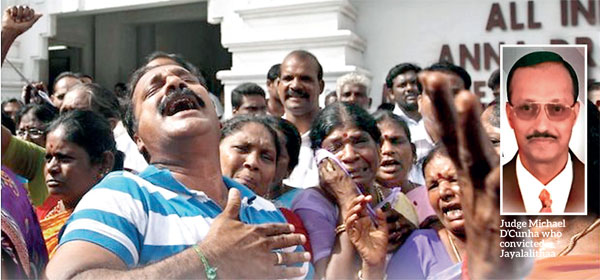Reply To:
Name - Reply Comment
 he land
he land mark judgment given by an Indian Court to incarcerate the all-powerful Tamil Nadu Chief Minister Jeyaram Jayalalithaa, who commands demigod status among South Indians and who has been a thorn in the Sri Lankan body politic must surely come as welcome news to a majority of Sri Lankans.
mark judgment given by an Indian Court to incarcerate the all-powerful Tamil Nadu Chief Minister Jeyaram Jayalalithaa, who commands demigod status among South Indians and who has been a thorn in the Sri Lankan body politic must surely come as welcome news to a majority of Sri Lankans.
She was found guilty of misusing power to amass enormous amounts of wealth during her political career between 1991 and 1996. What is of great significance is the fact that she is being imprisoned while holding high public office wielding tremendous political power practically calling the shots in Tamil Nadu. Her importance as a politician and the ability to influence the majority voters did not deter the judicial system in following the due process of law in indicting her and finding her guilty of wrongdoing.
In this context, all Sri Lankans have to most importantly understand the substance of this decision. It speaks much louder than numerous voices in this country, yelling empty rhetoric from elevated podiums, glorifying democracy, good governance and law and order. We often politicians shouting out that rule of law is applied to the letter as intended, all are equal and no one is above the law, irrespective of what office he or she holds or how powerful he or she may be.

The judgement by the Indian Court clearly substantiates the level of independence enjoyed by the Judicial System operating in the soil of our giant neighbor. It empowers Jurists to discharge their statutory duties and responsibilities disregarding social or political status of the individuals involved, without fear or favour upholding the cherished principles of jurisprudence. It also demonstrates the vibrant functioning of good governance in India, the largest democracy in the world where the legislature appears to remain aloof from the functioning of the legal system, practicing the principles of non-interference to ensure administration of justice.
This judgment also confirms the application of the noble principle that emanated from a famous English case that set a precedence on Impartiality and Recusal of Judges through the principle that “Justice should not only be done, but should manifestly and undoubtedly be seen to be done”.
Jayalalitha’s case should very clearly come as an eye opener for the body politic and judicial system of this country which on many occasions had been at loggerheads. How many in the body politic under successive governments in the post independent Sri Lanka could stand the test of the principles applied in the case where Jayalalitha was found guilty of abuse and misuse of public office and political power to disproportionately amass ill gotten wealth is an important question that goes abegging. The next question is if the judicial system of this country is capable of living up to the principle expressed by the famous aphorism that “Justice should not only be done, but should manifestly and undoubtedly be seen to be done”.
.jpg)
Time has come for those welding power in Sri Lanka’s political firmament to take a cue from its giant neighbor on how democracy should function. How law and order needs to be maintained and justice has to be administered to ensure due compliance with the principles of good governance for the greater benefit of the masses and ensure that the Public purse would not be misused and abused through crass extravagance, misguided priorities and sinister acts of self aggrandizement, at the expense of the suffering majority struggling as never before to eke out a living.